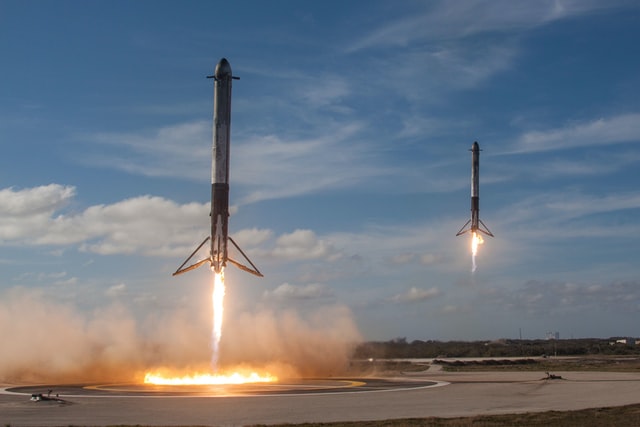
Flick through a news feed on your phone and you are likely to scroll across an article discussing the heated rivalries of the new space race. Forget the geopolitical struggles of a cold war. This time, it’s Tesla CEO Elon Musk versus Amazon founder Jeff Bezos: the two richest men in the world duking it out over whether SpaceX or Blue Origin, their respective companies, will be the dominant force in the new industry of private space flight.
Occasionally, Richard Branson of Virgin Galactic gets a mention too, but the Brit being a relative pauper, and his space plane lacking the phallic majesty of his fellow billionaires’ rockets, he has received diminishing attention in recent weeks.
The Musk v Bezos rivalry makes for good press and is stoked occasionally in tweets by both parties, but is it real? Probably not, according to our research, published in the book The New Patriarchs of Digital Patriarchy: Celebrity Tech Founders and Networks of Power, which analyses 95 popular books about the technology industry.
It is easy to see that, at a basic level, Musk’s and Bezos’s stated plans for space domination are complementary, rather than competitive. Bezos dismisses Musk’s plan to colonise Mars as unrealistic, while Musk thinks it will take too long to build the infrastructure for the giant orbiting space stations that Bezos proposes. Read between the lines and you can see how they had been rhetorically dividing up the space industry into separate monopolies even before their rockets broke the “Karman line” – one definition of where outer space begins.
The reality is that, as with other technology billionaires, such as Alphabet’s Larry Page and Sergey Brin, Facebook’s Mark Zuckerberg or even Palantir’s Peter Thiel, their interests align more often than they diverge. This new space race is partly a celebrity publicity stunt to generate clickbait headlines that build public awareness of, and popular support for, a new commercial frontier. If we focus on the rivalry and keep asking who’s winning, perhaps we won’t ask the big whys of commercial space colonisation.
In general, there is little in the tech barons’ interest to actually work against one another. Writing in his 2014 book Zero to One, Thiel has claimed that “competition is a relic of history”, and because a competitive market is seen as fundamental to capitalism, “monopolists lie to protect themselves”. These billionaires, all monopolists, may indeed use their celebrity profiles to create the illusion of competition where there is none. Google co-founder Larry Page also stated in a speech that Silicon Valley’s billionaires “travel as if they are pack dogs and stick to each other like glue”.
We learned through our research that the west coast billionaires that dominate the tech industry do indeed support each other financially and strategically. We carried out a digital search of a 10 million word database, containing the books we investigated, which is known as a broad context collocation. The algorithm searched for instances in which the entrepreneurs were listed together, and sorted it by context – such as collaboration, rivalry, friendship, political lobbying and philanthropy. This helped us identity a dense network, which you can see in the diagram.
So while Bezos and Musk haven’t directly financially supported each other, they are part of a wider system that has. Bezos was an early funder of Google, and in turn Google’s founders put money into Musk’s ventures from as early as 2006. As Ashlee Vance writes in his biography of Musk, Google underwrote Tesla to the tune of $5 billion (£3.6 billion) in 2013 when it looked as if it was about to go under, as well as investing large sums in SpaceX at critical moments.
Race to the bottom?
There are plenty of good reasons to be exploring space, but we just don’t know if these billionaires will prioritise profit or science, benefits to humanity or a much narrower substratum of the wealthy. The signs don’t look good, as Musk launches thousands of Starlink satellites that risk turning low earth orbit into a junk yard. Meanwhile, the ten minutes of weightlessness offered by Bezos are a luxury affordable only to the 0.01% – not to mention being damaging for our planet.
As a group, Silicon Valley entrepreneurs present a shared belief in using technological solutions to social problems. Social media platforms are designed to better connect us by fostering divisions, and spaceships offer a way to escape a planet that may no longer be able to comfortably support us. These solutions and the problems they purport to solve have been presented to us, since the days of Steve Jobs, the late chairman of Apple, as the result of the vision of the “genius founder” – an awkward, but dazzling leader: a mythic figure who expands the frontiers of human endeavour. It started with home computers, then went online and now it is soaring into space.
Instead of dividends (another relic, like competition), these businesses are valued in headlines, tweets and “vision”. Tesla is the most valuable car company in the world based almost entirely on Musk’s celebrity inspiring a legion of fans to invest in the company. Amazon is a ruthless monopoly that secured its early market lead after aggressive tax avoidance and punishing hours for its staff. But because Bezos is framed as an inspirational CEO, a culture of overwork has been transformed into the can-do spirit of the American frontier.
These entrepreneurs tell us compelling stories about their lives, their businesses and their vision. We will never know if they are true, manicured and coiffured as they are through one of the most successful publicity machines in history. So if we find ourselves swimming in clickbait about these men, it’s not incidental that we find them alongside celebrity news: it’s absolutely fundamental to their business strategies and thus a key source of their wealth and power.
By:
Ben Little Lecturer in Media and Cultural Politics, University of East Anglia
Disclosure statement
Ben Little does not work for, consult, own shares in or receive funding from any company or organisation that would benefit from this article, and has disclosed no relevant affiliations beyond their academic appointment.
